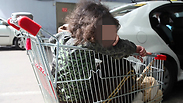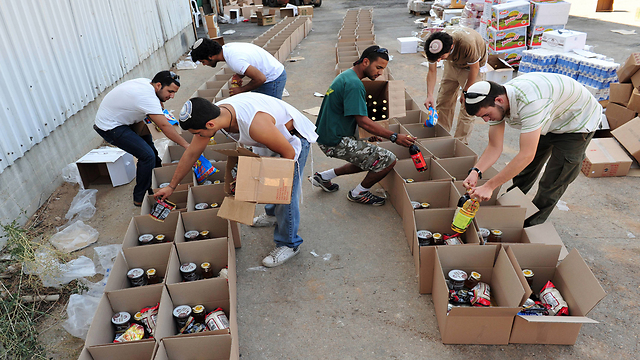
UNICEF: More than one third of Israeli children live in poverty
Report by UN agency for children puts Israel in highest bracket for child poverty in developed world; figures tally with NII report that 817,200 children live below poverty line in Israel; UNICEF Israel: This report is a warning light for country.
They don't participate in economic discussions, and they don't know how to read budget reports; but they do know and experience the meaning of the term, poverty, on a daily basis. Some 35.6 percent of children in Israel are poor children, according to a newly published UNICEF report.
The UN agency's report, relating to 2012, ranks Israel a dubious fourth in terms of child poverty in the developed world, with only Spain (36.3 percent), Latvia (38.2 percent) and Greece (40.5 percent) worse off. Scandinavian countries boast relatively low rates of child poverty – 5.3 percent in Norway, 8.8 percent in Finland, and 10.2 percent in Denmark; in Germany, according to the report, the child poverty rate stands at 15 percent.
Because poverty is a disputed concept, in explaining the figures they arrived at, the authors of the UNICEF report noted that in most countries, the poverty line runs somewhere between 50 and 60 percent of the median annual family income. For example, UNICEF's previous report, in 2008, set the poverty line in Israel at NIS 2,256 shekels per capita – exactly 50 percent of the median annual income per capita that same year (NIS 4,513).
The researchers also compared the 2012 poverty line to the poverty line in 2008, the start of the global economic crisis. This comparison allowed the researchers to show how the economic situation of families all over the world deteriorated as a result of the sharp drop in the median family income caused by the recession.
According to the report, the rate of poor children in Israel rose half a percent from 2008 to 2012 – a relatively low increase when compared with other countries around the world. In Iceland, for example, the number of poor children rose by more than 20 percent during the same period, while Greece saw an increase of 17.5 percent in its child poverty rate. Countries that showed a significant reduction in their child poverty rates include Chile, which recorded a drop of more than 8 percent, and Poland, where the rate dropped 7.9 percent.
The report also points to an increase in Israel in the number of poor children from single-parent families. On the other hand, the report indicates a slight decline in the number of poor children in families with two parents. The report also argues that the reasons for the increase in poverty could be related to the cut in child allowances.
UNICEF officials claim that the economic crisis in the developed world in recent years has pushed some 2.6 million children below the poverty line. According to UNICEF estimates, approximately 76.5 million children now live below the poverty line in all of the developed countries. Since 2008, the child poverty rate has risen in 23 of the 41 developed countries.

The worrying figures should not come as a surprise to the welfare authorities and government in Israel. According to the last poverty report published by the National Insurance Institute, Israel is home to 1,754,700 poor people, 817,200 of whom are children. The Alalouf Commission, charged with the task of bring Israel up to the OECD average within 10 years by means of a multi-year investment in combating poverty, submitted its findings just a few weeks ago, but most appear to have been brushed over and won't be included in the upcoming budget.
"This report is a warning light for Israel," said John Klein, CEO of UNICEF Israel. "We need to focus on the children in order to bring about a long-term change and not deteriorate even further. I hope that the state realizes that it needs to focus on the children and channel resources to them even at the expense of other things."
In another chapter of the comprehensive report, Israel, with a rate of 30.7 percent, ranks among developed countries when it comes to individuals aged 15 to 24 who are not in school, employed or undergoing professional training. However, these numbers can be explained in part by the fact that 18-year-old Israelis enlist in the army, after which many travel abroad and don't join the workforce or continue their education until they are older.
According to the UNICEF report, "the current and future lives of children have been – and are being – neglected in the global response to the Great Recession. Should this neglect persist, the crisis for children will continue to be felt well after the economic recovery. The long-term social health of our societies is at risk. If generations have defining moments, this is certainly one of them."
Responding to the figures, Eran Weintraub, executive director of the Latet organization, said: "The poor children in Israel, those who hide behind the numbers in the poverty report, are living in severe nutritional insecurity, often don't have access to health services and don't receive proper education; the chances of them slipping into violence are high, and the changes of them getting to university and escaping their poverty are almost nothing. The war against poverty is a war of necessity because it is a war for the future and existence of Israeli society,
Waiting for a miracle
H. is the father of four children, including an 18-month-old baby. Due to his medical condition, H. is not able to work, and his wife, who cares for the baby, is currently looking for a job but to no avail. For a year now, H. has been forced to collect cans and bottles in order to provide his children with breakfasts and sandwiches to take to school.
"I collect 300 bottles a day to buy food for the children," he says. "I'm not ashamed to tell you because I once used to steal baby milk formula, chickens and anything else I could get my hands from the supermarket. I'd go out through the emergency exit, and by the time they got there, I'd be gone already."
H. is defined as a disabled Israel Defense Forces veteran who was wounded in the leg in Lebanon and for which he receives an allowance of NIS 500 a month. A year ago, he was run down by a car while crossing the street and has been unable to work ever since. He says he receives an additional NIS 500 a month from the NII; that, together with the NIS 500 disability allowance from the army, is the sum total of his family's monthly income.
"I used to work as a truck driver and my wife had an admin job," H. says. "Today, she cares for the baby and is desperately seeking work. We barely have food to eat; I don't have money for dental care; we don't have a TV at home and no computer. We live in a state-subsidized apartment in the north and pay rent of NIS 200 a month. We do not have a bank account or a credit card. The children don't go to shows or extramural activities.
"Were it not for the Yad Ezra and Shulamit Association, the children would starve and go naked. The association provides us with a food basket, vouchers for buying food, clothes and shoes. We are waiting for a miracle and crying out for help now." (Goel Beno)











